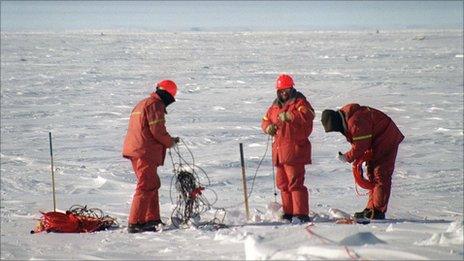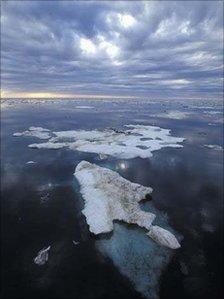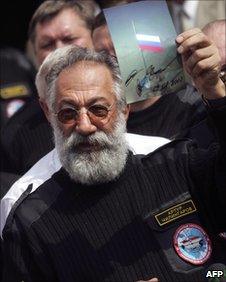Russian Arctic diplomacy hots up
- Published

The Arctic is believed to contain massive reserves of petroleum and oil
The pace of diplomacy over the division of the Arctic is speeding up, with Russia making the running.
It recently agreed with Norway on a maritime boundary in the Barents Sea to end a dispute that had left the region a grey area for potential mineral exploration for 40 years.
Shortly afterwards, Russia and Canada accepted that the UN should rule on who owns what part of the Lomonosov Ridge, the continental shelf that could potentially give exploration rights up to the North Pole.
Both sides said they were confident of success.

Efforts to explore the fragile region are fraught with tensions
The process is being spurred by the belief that a melt of Arctic ice will one day become significant enough to allow for previously impossible energy and resource exploration and development.
The incentive remains, even though predictions of summer ice disappearing within a few years are now regarded as pessimistic.
The Russian Geographical Society is hosting a special conference on the Arctic in Moscow this week called the Arctic Forum. It is not just a meeting of scientists and environmentalists. Prime Minister Vladimir Putin will attend in a demonstration of how important the Arctic is to Russia's interests.
As the conference takes place, the Russian polar flagship Akademik Fedorov is out at sea in the final phase of an exploration to support Russia's claim to the Lomonosov Ridge.
And Russian explorer Artur Chilingarov, who led a 2007 expedition that placed a metal Russian flag on the seabed under the North Pole, is to head a scientific expedition next month in further support of Russia's claim.
All claims over the Arctic are made to the UN under the United Nations Convention on the Law of the Sea (UNCLOS)., external
The convention says that a country has the right to exploit oil and minerals up to 200 nautical miles (370km) from the edge of its continental shelf.
It can make a claim that the shelf goes beyond that and, if the claim is accepted, rights would then be extended.
The Russian agreements are putting pressure on others to act to shore up their positions.
Two years ago, it was agreed that disputes should be settled through the UN in an orderly way.
At the time, the Danish Foreign Minister Per Stig Moller said: "We have hopefully quelled all myths about a race for the North Pole once and for all."

Artur Chilingarov shows picture of the Russian flag planted at the North Pole
However that does not mean that diplomatic efforts to gain advantage have been reduced.
In an e-mail to investors, Chris Weafer, chief strategist of the Uralsib Bank in Moscow, wrote: "Canada and the US oppose the [Russian] claim but Norway may now be more supportive."
And Mr Weafer noted another factor at work here: "On a geo-political level, this deal is yet another example of Russia resolving long-standing disputes as it pursues a new and softer foreign policy."
Canada and the United States are also acting. They each sent a coast guard ship on a joint data-finding mission this summer into the Beaufort Sea, to help determine the extent of their continental shelves.
Canada, in particular, feels that it must assert its sovereignty over what it regards as its share of the Arctic and has beefed up its military measures in the region. Earlier this year it notified ships that they had to register if they wanted to go through the Northwest Passage.
It said this was an environmental measure but it reinforced Canada's claim over the passage, which it regards as an internal waterway. The US says it is an international sea.
The Canadian prime minister Stephen Harper went on a tour of the Arctic this summer, saying: "We live in a time of renewed foreign interest in Canada's Arctic. With foreign aircraft probing the skies, vessels plying northern waters, and the eyes of the world gazing our way, we must remain vigilant."
By "foreign" he meant Russian, as Russian planes have probed the Canadian northern border.
The Northwest Passage has a special place in the Canadian psyche, and is therefore a political factor in all this. A flavour of its romance for Canadians is caught in a song written by folk singer Stan Rogers:
Ah, for just one time I would take the Northwest Passage
To find the hand of Franklin reaching for the Beaufort Sea
Tracing one warm line through a land so wide and savage
And make a northwest passage to the sea
- Published9 July 2010
- Published2 August 2010
- Published15 September 2010